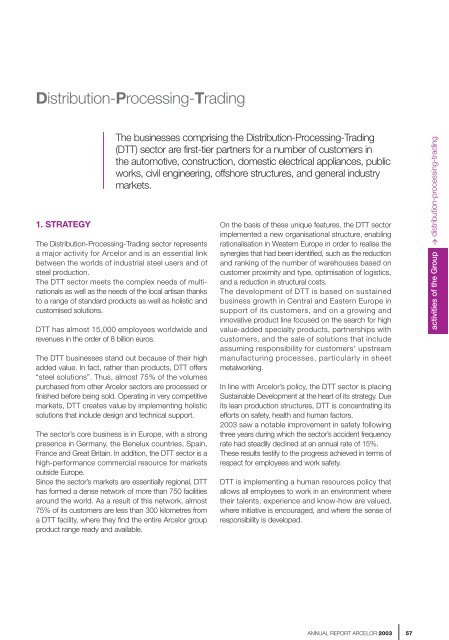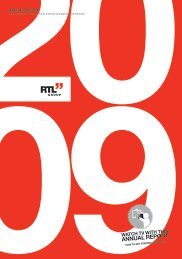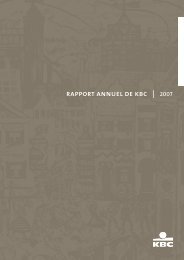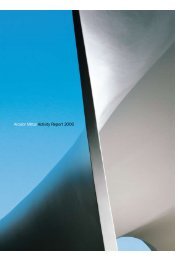ANNUAL REPORT ARCELOR 2003 - paperJam
ANNUAL REPORT ARCELOR 2003 - paperJam
ANNUAL REPORT ARCELOR 2003 - paperJam
You also want an ePaper? Increase the reach of your titles
YUMPU automatically turns print PDFs into web optimized ePapers that Google loves.
Distribution-Processing-Trading1. STRATEGYThe businesses comprising the Distribution-Processing-Trading(DTT) sector are first-tier partners for a number of customers inthe automotive, construction, domestic electrical appliances, publicworks, civil engineering, offshore structures, and general industrymarkets.The Distribution-Processing-Trading sector representsa major activity for Arcelor and is an essential linkbetween the worlds of industrial steel users and ofsteel production.The DTT sector meets the complex needs of multinationalsas well as the needs of the local artisan thanksto a range of standard products as well as holistic andcustomised solutions.DTT has almost 15,000 employees worldwide andrevenues in the order of 8 billion euros.The DTT businesses stand out because of their highadded value. In fact, rather than products, DTT offers“steel solutions”. Thus, almost 75% of the volumespurchased from other Arcelor sectors are processed orfinished before being sold. Operating in very competitivemarkets, DTT creates value by implementing holisticsolutions that include design and technical support.The sector’s core business is in Europe, with a strongpresence in Germany, the Benelux countries, Spain,France and Great Britain. In addition, the DTT sector is ahigh-performance commercial resource for marketsoutside Europe.Since the sector’s markets are essentially regional, DTThas formed a dense network of more than 750 facilitiesaround the world. As a result of this network, almost75% of its customers are less than 300 kilometres froma DTT facility, where they find the entire Arcelor groupproduct range ready and available.On the basis of these unique features, the DTT sectorimplemented a new organisational structure, enablingrationalisation in Western Europe in order to realise thesynergies that had been identified, such as the reductionand ranking of the number of warehouses based oncustomer proximity and type, optimisation of logistics,and a reduction in structural costs.The development of DTT is based on sustainedbusiness growth in Central and Eastern Europe insupport of its customers, and on a growing andinnovative product line focused on the search for highvalue-added specialty products, partnerships withcustomers, and the sale of solutions that includeassuming responsibility for customers’ upstreammanufacturing processes, particularly in sheetmetalworking.In line with Arcelor’s policy, the DTT sector is placingSustainable Development at the heart of its strategy. Dueits lean production structures, DTT is concentrating itsefforts on safety, health and human factors.<strong>2003</strong> saw a notable improvement in safety followingthree years during which the sector’s accident frequencyrate had steadily declined at an annual rate of 15%.These results testify to the progress achieved in terms ofrespect for employees and work safety.DTT is implementing a human resources policy thatallows all employees to work in an environment wheretheir talents, experience and know-how are valued,where initiative is encouraged, and where the sense ofresponsibility is developed.activities of the Group > distribution-processing-trading<strong>ANNUAL</strong> <strong>REPORT</strong> <strong>ARCELOR</strong> <strong>2003</strong> 57
















